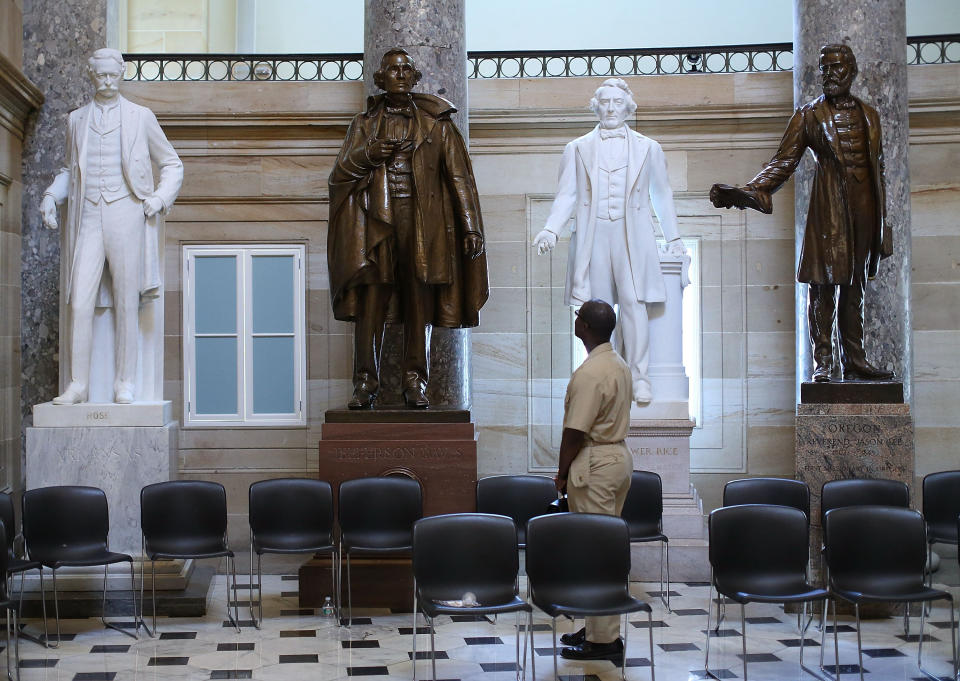Bill to remove Confederate statues from Capitol stalled by Missouri's Blunt

- Oops!Something went wrong.Please try again later.
Sen. Roy Blunt, R-Mo., has blocked a bill to remove 11 statues honoring members of the Confederacy from the U.S. Capitol, saying he wanted to slow the process down.
Senate Democrats sought to pass the Confederate Monument Removal Act by unanimous consent, meaning it would clear the chamber without a formal vote as long as no legislator objected. Practically all routine Senate business is handled this way. Blunt objected, stating he wanted to consider a hearing and to understand what the states would do with the statues if they were removed.
“I’d like to ... get the opinion of people who are taking similar statues out of the building. I’d also like to find out what other states have in mind as their part of this agreement,” Blunt said. “I’d certainly like to have some time to see if we should have a hearing on this.
“It would have the effect of abandoning agreements that we have entered into with the states and the states have entered with us,” he added. “This is a more complicated arrangement than the activity on the floor today would suggest.”
The legislation, introduced by Sen. Cory Booker, D-N.J., last week, would remove the statues of anyone who voluntarily served in the Confederacy from the National Statuary Hall Collection within 120 days of passage. The bill was previously introduced by Booker and Rep. Barbara Lee, D-Calif., in 2017 but never gained traction.
“Individuals who committed treason against the United States of America and led our nation into its most painful and bloody war to preserve the institution of slavery are not patriots and should not be afforded such a rare honor in this sacred space,” said Booker, who is Black. “The continued presence of these statues in the halls of Congress is an affront not just to Black Americans, but to the very ideals we as a nation proclaim, that we are a place of liberty and justice for all.”
“Candidly, I don’t think it would be too imposing to ask our states not to send statues of people who actively fought against this country,” said Senate Minority Leader Chuck Schumer. “You know, there is a reason that Connecticut doesn’t send a statue of Benedict Arnold.”

Each state is allowed to contribute two statues to the hall, and Alabama, Arkansas, Florida, Georgia, Louisiana, North Carolina, South Carolina, Virginia and West Virginia all have bestowed that honor on men who served the Confederacy. Both of Mississippi’s are tied to the Confederacy, including the secessionist president, Jefferson Davis. In 2018, Florida passed legislation to replace the statue of Confederate Gen. Edmund Kirby Smith with one of Mary McLeod Bethune, an African-American educator and civil rights activist.
On Thursday, House Speaker Nancy Pelosi ordered the removal of portraits of four speakers who had served in the Confederacy.
“As I have said before, the halls of Congress are the very heart of our democracy,” Pelosi wrote in a letter to House Clerk Cheryl L. Johnson requesting the removal of the portraits. “There is no room in the hallowed halls of Congress or in any place of honor for memorializing men who embody the violent bigotry and grotesque racism of the Confederacy.”
On Thursday, the portraits were removed and placed into House collection storage. Slave labor contributed to the construction of the Capitol building itself.
“We didn’t know about this until we were taking inventory of the statues and the curator told us that there were four paintings of speakers in the Capitol of the United States, four speakers who had served in the Confederacy,” Pelosi said Thursday.
The push to remove Confederate tributes from the Capitol is part of a nationwide — and, in some instances, global — movement to take down monuments to historical figures who are associated with slavery or racism. Statues of Confederate officers, mayors who oppressed black communities, Spanish conquistadors who massacred indigenous populations and explorer Christopher Columbus have been taken down across the nation, either by civilians or by authorities trying to head off possibly dangerous spontaneous action by demonstrators.
Congress is also considering the renaming of 10 U.S. military bases named after Confederates, a move for which Blunt has expressed support.
“I expressed my belief that it would be absolutely appropriate, in my view, to review the names of the forts … that are named after Confederate military leaders and change those names,” said Blunt, comparing the issue with the statue selections, which he argued require state-level approval. “And we can do that all on our own.”
_____
Read more from Yahoo News:



